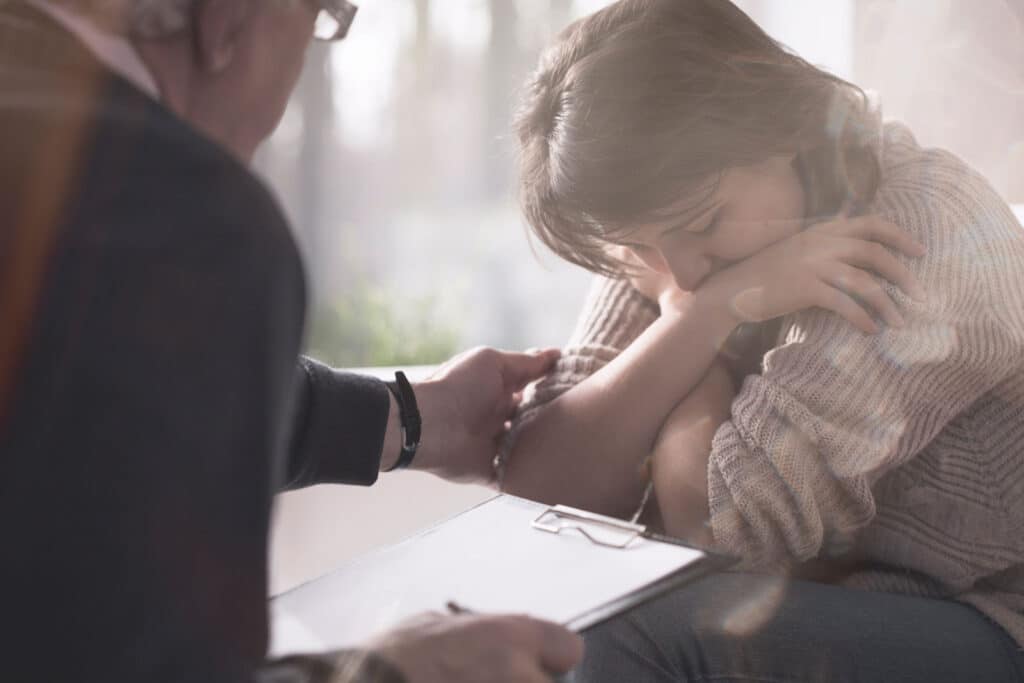Group therapy is an underutilized tool in our lives. Most of us associate such groups with post-substance use recovery or mental disorders.
In reality, the effectiveness of group therapy can be a massive boost to our daily lives, even if we’re not particularly suffering from a certain mental issue or substance dependence.
We’ll have an in-depth look into group therapy and what it means to your overall well-being, explain its ins and outs, and show you how to find a therapist that you can trust.
Group Therapy: What Does It Really Mean?
Group therapy, as defined by the American Psychological Association (APA), is a form of psychotherapy in which one or more therapists work together with a small group of clients.

This therapeutic approach is designed to harness the dynamics of the group setting, where members can interact, share experiences, and provide mutual support under the guidance of a trained therapist.
While not standardized, there are five primary key elements to group therapy:
There Must be a Therapeutic Environment
The group setting creates a safe and supportive environment where individuals can express themselves openly, gain insights, and learn from others’ experiences.
Group Dynamics
The interactions within the group are a central aspect of the therapy. Group members often share similar issues or challenges, and the collective experience can lead to increased self-awareness, empathy, and emotional growth.
Support and Feedback
Members of the group provide support, feedback, and different perspectives, which can help individuals understand their own behavior, develop new coping strategies, and feel less isolated in their struggles.
Diversity of Perspectives
Group therapy often includes individuals from diverse backgrounds, which can enrich the therapeutic process by exposing participants to a variety of viewpoints and life experiences.
It’s Always Guided by a Mental Health Therapist
The therapist’s role is to facilitate the group process, encourage open communication, and ensure that the group remains a safe and productive space for all participants.
The therapist may also introduce specific therapeutic techniques or exercises to address everyone’s needs and ensure group cohesiveness.

Benefits of Group Therapy
Here’s why group therapy can improve your overall mental health:
1. Support from Peers
“The establishment of an authentic relationship with patients, by its very nature, demands that we forego the power of the triumvirate of magic, mystery, and authority.” ― Irvin D. Yalom
Group therapy offers the unique benefit of peer support. Members of the group can relate to each other’s experiences and provide mutual encouragement. This shared understanding can create a strong sense of belonging, reducing feelings of isolation and loneliness.
2. Diverse Perspectives
Group therapy allows individuals to hear different perspectives on their problems. Group members often have varied backgrounds and experiences, which can provide new insights and solutions that someone might not have considered on their own.
3. Improved Social Skills
For those struggling with social anxiety or difficulties in relationships, group therapy can serve as a safe space to practice and improve social skills. The group setting encourages interaction, communication, and collaboration, which can help participants build confidence in social situations.

4. Cost-Effective Therapy
Group therapy is often more affordable than individual therapy, as the cost is shared among the participants. This makes it a more accessible option for individuals who need psychotherapist support but may be unable to afford one-on-one sessions with a therapist.
5. Learning from Others’ Progress
Seeing how others in the group overcome challenges can be inspiring and motivating. Witnessing others’ progress can instill hope and provide practical strategies that participants can apply to their own lives.
6. Accountability
The group setting fosters a sense of accountability, as members are encouraged to follow through with their therapeutic goals. Knowing that others are invested in their progress can motivate participants to stay committed to the therapeutic process.
7. Enhanced Self-Awareness
Through feedback and guided discussions within the group, participants can gain greater insight into their own thoughts, behaviors, and patterns. This increased self-awareness can lead to more effective coping strategies and personal growth.
8. Therapist Guidance in a Group Context
Even though group therapy involves multiple participants, a trained therapist still guides the process. This professional oversight ensures that the group stays focused and that each member’s needs are addressed in a supportive and constructive manner.

Who Needs Group Therapy?
The short answer is that almost everyone needs group therapy at one point in their lives. However, some people do require such therapy more than others. Here are some examples:
1. Those Struggling With Substance Abuse
Group therapy provides a supportive environment for individuals battling addiction. It offers peer support, accountability, and shared experiences that can be crucial in the recovery process.
2. Individuals With Anxiety Disorders
In group settings, those with anxiety can practice social interactions, learn coping strategies from peers, and realize they’re not alone in their struggles.
3. People With Depression
Group therapy can help combat the isolation often associated with depression. It provides a platform for sharing experiences and learning from others who understand the challenges.
4. Those Struggling With PTSD
Group therapy allows individuals with PTSD to connect with others who have similar experiences, reducing feelings of alienation and providing a safe space to process trauma.
5. Individuals With ADHD
Group sessions can help those with ADHD develop strategies for organization, time management, and impulse control. They can also learn from others’ experiences with medication and coping techniques.
6. People Dealing with Trauma
Trauma-focused group therapy can provide a supportive environment for processing traumatic experiences and learning healthy coping mechanisms.

7. Those With Eating Disorders
Group therapy can address the social and emotional aspects of eating disorders, providing peer support and challenging distorted thoughts about body image and food.
8. People Facing Social or Behavioral Challenges
Group settings offer a controlled environment in which to practice social skills and receive immediate feedback on behaviors.
9. Individuals Experiencing Grief or Loss
Grief support groups allow individuals to share their experiences, emotions, and coping strategies with others who truly understand their pain.
10. People With Chronic Pain
Group therapy can help individuals with chronic pain develop pain management strategies, address associated mental health issues, and find support from others facing similar challenges.
11. People With Bipolar Disorder
Group therapy can provide education about the disorder, help in identifying triggers and early warning signs, and offer support during both manic and depressive episodes.
12. Individuals With Schizophrenia
Group therapy can help individuals with schizophrenia improve social skills, learn to manage symptoms, and reduce social isolation.
13. People With Obsessive-Compulsive Disorder
In group settings, individuals with OCD can learn from others’ experiences with exposure and response prevention techniques, and gain support in challenging their obsessive thoughts.

Where to Find Group Therapy?
Countless group psychotherapy organizations can be found everywhere, so it’s not a matter of finding group therapy sessions, it’s a matter of finding ones that you can trust.
One of the quickest ways to ensure a place has an ideal group treatment (as well as ensuring the best interventions and providers) is by looking for the gold seal of approval from the Joint Commission).
If you or your loved one happen to live in Florida and are in search of group therapy and mental health care that you can trust, we’d love to meet you at Recreate Behavioral Health Network. We are proud owners of the Gold Seal.
Also, we offer all kinds of services that range from telemedicine all the way to substance abuse detox, teaching coping skills, and providing the necessary coping skills—all under the supervision of licensed mental health professionals.
You can give us a call today or pay us a visit in person at 7700 W Camino Real Suite 404, Boca Raton, FL 33433.








